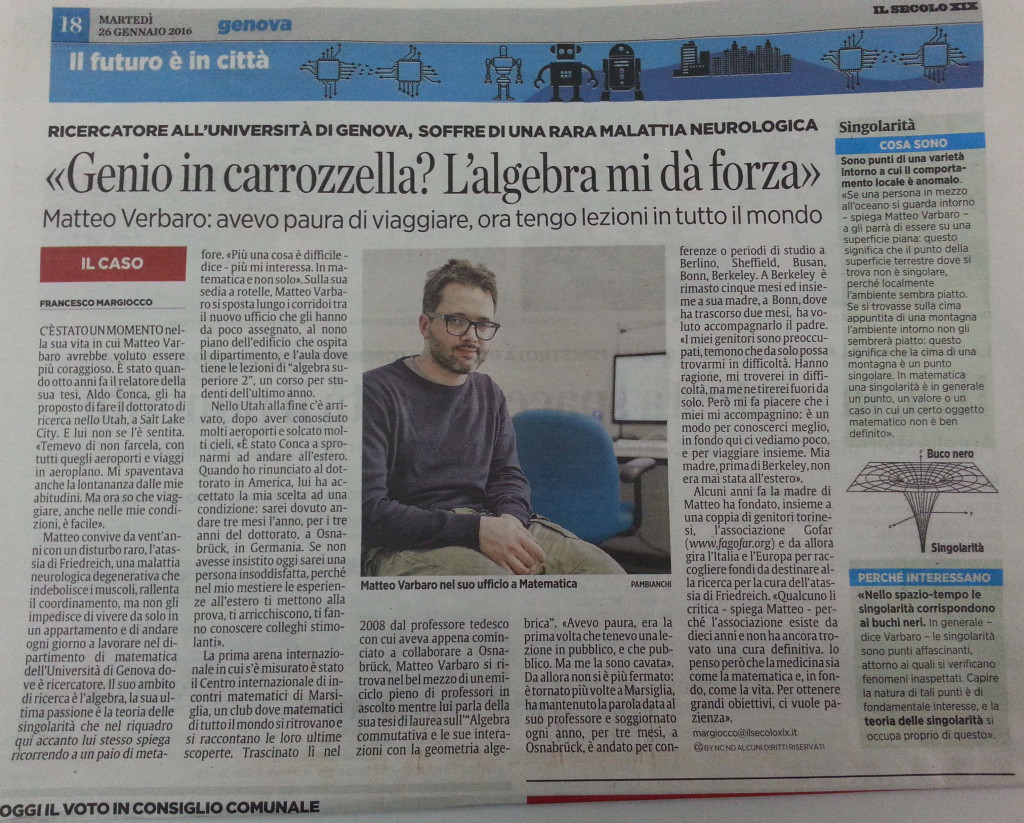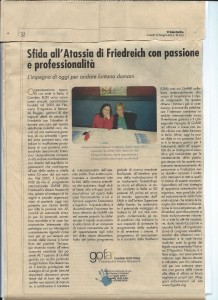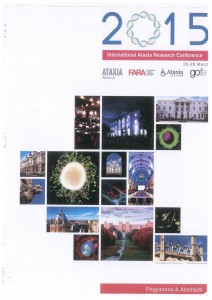Category Archives: Novita’



Progetto: Early and longitudinal assessment of neurodegeneration in the brain and spinal cord in Friedreich’s ataxia (II year)
Principal Investigators: Pierre-Gilles Henry, Ph.D, Christophe Lenglet, Ph.D – Center for Magnetic Resonance Research, Department of Radiology,University of Minnesota Medical School, Minneapolis US
We propose to assess the sensitivity of candidate biomarkers forFriedreich’s ataxia in patients, using Magnetic Resonance Imaging (MRI) techniques.Sensitive early-stage biomarkers of the disease are currently lacking in Friedreich’s Ataxia (FRDA).Such biomarkers would constitute an invaluable tool for monitoring disease progression in prospective therapeutic trials.In this project, we propose to use both Magnetic Resonance Spectroscopy (MRS) and diffusionMagnetic Resonance Imaging (diffusion MRI). MRS allows non-invasive measurement of a“neurochemical profile” of 10-15 metabolites, and has the potential to reveal biochemical alterations in the nervous system before irreversible tissue damage. Diffusion MRI, in combination with advanced white matter fiber orientation mapping and tractography algorithms, provides unprecedented information about the integrity of the cerebral, cerebellar and spinal axonal wiring.Preliminary data obtained in our center in the past year shows significant differences in both MRS and diffusion MRI data between patients and controls. In this project based on our preliminary results, we propose to focus on a subset of the data already acquired and investigate year-to-year temporal changes in Friedreich’s ataxia.We hope to identify sensitive biomarkers of the disease in the central nervous system of patients with Friedreich’s ataxia at an early stage, and gain better insights into their temporal evolution. These aims could ultimately provide novel and unique tools for the quantitativeassessment of treatment efficacy in prospective therapeutic trials.
Finanziamento: 150,000 $ (1anno da 1 Settembre 2015) Co-finanziato da FARA e Ataxia UK


Progetto: Investigation of mitochondrial function and novel therapies in Friedreich’s ataxia mouse models (II years)
Principal Investigator: Dr. Paola Giunti, Co-PI Andrey Abramov Department of Molecular Neuroscience Institute of Neurology, UCL, London
We propose to study the mitochondrial pathophysiology in FRDA using mouse models (YG8R and KIKO), and the pharmacological effects of Nrf2 inducers and D-PUFAs compounds on the mitochondrial function in models, looking at different cell types variably involved in the disease, such as neurons and glia of the cerebellum and kidney fibroblast cells.
The methodologies chosen to achieve our goals include: cell biology, functional microscopy, fluorescence imaging techniques, and oxygen consumption measurements. Experiments will be conducted initially on primary cultures of cerebellar granular cells, co-cultures of neurons and glia, freshly isolated a kidney fibroblast cells. These cell culture preparations are currently used in our lab for other projects. The assays will include pre-clinical studies of two different types of drugs that will tackle potential therapeutic targets to envisage novel pharmaceutical trials for FRDA patients. The first type of compounds are Nrf2 inducers, that will trigger the antioxidant pathway of Nrf2, which has been found to be involved in FRDA (Shan et al,. 2013), and will also provide mitochondrial respiration substrates, helping the mitochondrial bioenergetics (Homstrom et al., 2013; Luthmann et al., 2013). The second type of compounds, D-PUFAs, will protect the cells from lipid peroxidation, which is relevant in FRDA mitochondrial function and, more importantly, our preliminary data has shown that FRDA mouse model cerebellar granule cells undergo dramatic increases in lipid peroxidation.
Finanziamento: 77,586 GBP ( 1anno da 21 Agosto 2015) Co-finanziato da FARA






